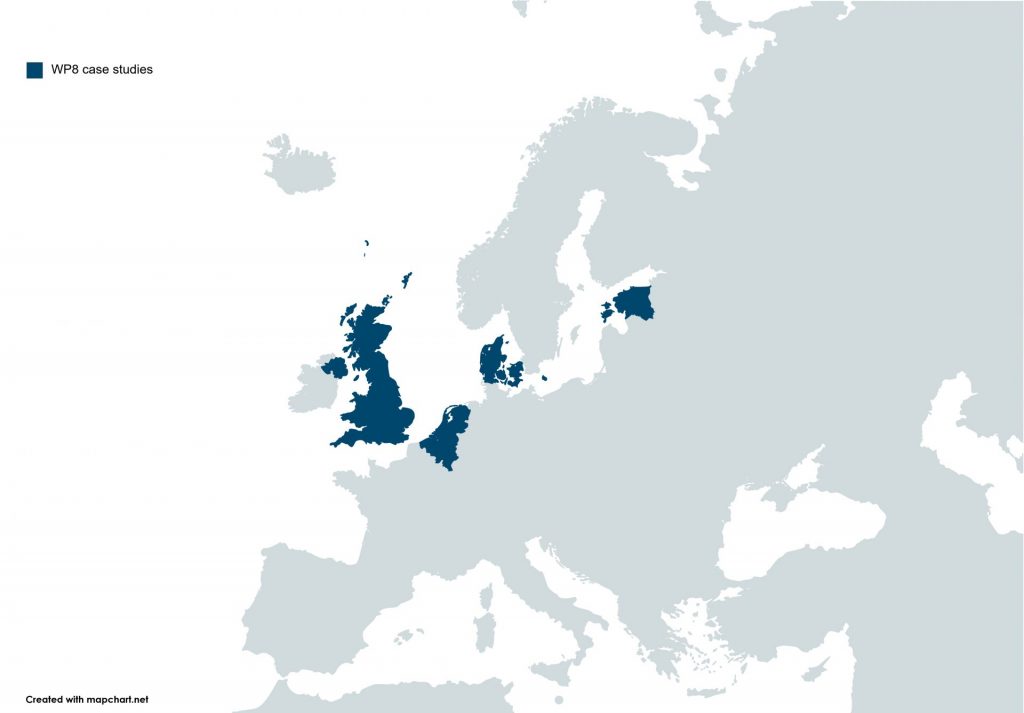Effects of Collaboration for Legitimacy and Accountability (Work Package 8 – WP8)
Led by Roskilde University (Denmark), this work package conducted research from November 2019 until November 2021.
The WP8 team’s objective was to analyse the impact of collaboration on legitimacy and accountability, and to develop assessment tools to measure those for collaborative governance.
WP8 looked into two main research conducted:
- How are ICT systems enabling and shaping new forms of accountability in collaborative policymaking?
- How such systems can be used to gauge various forms of legitimacy of the design and delivery of public policy?
To answer these questions, the WP8 team conducts:
- A systematic literature review on legitimacy and accountability in the context of collaborative governance
- Comparative case studies of collaborative governance within employment policy
- A social network analysis to identify contact patterns of account giving and the assessment and sanctioning of such accounts
Research
The research work in WP8 started with conducting case studies on collaborative governance, with a special focus on collaboration’s effects for accountability, in five European countries: Belgium, Denmark, Estonia, the Netherlands, and the UK. The case studies were based on interviews, document studies and observations of public authorities. In their research, the WP8 team focused on collaborative service delivery in public employment services, aiming at tackling the problem of long-term unemployment. See D8.1 Networks of account-giving in long-term unemployment collaborations in five countries.
This was followed by conducting a comparative analysis of the case studies. The WP8 team contextualised their case studies by mapping the governance structures and accountability relations (including the role played by different types of accountability and the significance of ICT) in the analysed initiatives. The results of the comparative analysis draw attention to key points relevant for researchers and practitioners working in similar collaborative arrangements. The recommendations are presented in a research report and touch upon i.a. the effects of quantifiable performance indicators, developing standardized routines for account-giving between the actors in the collaboration, the need for resources in order to ensure accountability and engaged reception. See D8.2 Long-term Unemployment Collaborations in Five Countries: Challenges and Lessons Learned.
An important part of the WP8 team’s work was designing and testing criteria-based assessment indicators and tools to measure the legitimacy of different collaborative initiatives. The assessment primarily looked into arrangements connected to co-creation of public policies and services, with inclusion of private stakeholders and citizens. The indicators were integrated in the Collaboration Monitor – an online self-assessment tool enabling the practitioners engaged in collaborative arrangements to gauge their performance in legitimacy and efficiency (see also Work Package 9 - Effects of Collaboration for Government Efficiency) and compare good practices in innovative collaboration connected to service delivery and policy design.
The indicators on legitimacy in the Collaboration Monitor will be presented in a policy brief. See D8.4 Policy Brief, expected in April 2021.

Results and findings
The WP8 team has completed two closely related deliverables: The comparative network analyses (D8.1) and a research report (D8.2) based on the former.
The comparative network analysis (D8.1) undertakes in-depth case studies of innovative local initiatives in five different settings and national contexts in order to explore complex accountability relationships, the tensions in between them, and, not least, how they may be mitigated. The WP8 team studied initiatives from the Netherlands, Belgium (Flanders), Estonia, the United Kingdom (Scotland), and Denmark. Integral to the questions above, the case studies pay attention to whether and how ICT plays a role in the account-giving. In the case of collaborative and holistic efforts of re-integrating long-term unemployed, the role of ICT is important in at least two ways. First, many public employment services (PES) use digital platforms to manage the individual plans and cases, and, thus, the accountability of various stakeholders, including the citizen. Often these are based on forms of performance accountability that may or may not foster collaboration in between stakeholders. Secondly, cross-sectoral and public-private collaborations are confronted with great challenges in sharing data where ICT can play the role of catalyst as well as barrier to collaboration. The five cases all demonstrate, albeit in different ways, the challenges implied by making existing ICT systems support, rather than obstruct, collaborative governance solutions.
The research report (D8.2) analyzes the case studies with regard to differences and similarities of the accountability relations embedded in handling long-term unemployment in a collaborative fashion. At the most general level, the comparative analyses suggest that demands for account-giving have been growing, more new types of accountability are entering the field, and ICT systems play an important role in supporting these. On the one hand, the many accountability channels, relations and types are providing legitimacy to the collaborative governance processes. On the other hand, they raise a number of challenges that at times seem to be impeding the goal of providing collaborative services revolving around the needs of the individual citizen. Based on the experiences from the five case countries, the WP8 team has issued a set of recommendations for handling these challenges.
Scientific publications
The WP7 research will be concluded by the publication of journal articles and a Special Issue on accountability and legitimacy under collaborative governance, to be published in Public Management Review. Upcoming publications will be shared on the TROPICO community on the repository Zenodo.
Several articles from the Special Issue are already available online:
Triantafillou, P., & Hansen, M. P. (2021). Introduction to the PMR special issue on accountability and legitimacy under collaborative governance. Public Management Review.
Klijn, E.-H., Nederhand, J., & Stevens, V. (2021). The necessity of collaboration in branding: analysing the conditions for output legitimacy through qualitative comparative analysis (QCA). Public Management Review.
Lægreid, P., & Rykkja, L. (2021). Accountability and inter-organizational collaboration within the state. Public Management Review.
(upcoming) Dupuy, C., & Defacqz, S. (2021). Citizens and the Legitimacy Outcomes of Collaborative Governance. An Administrative Burden Perspective. Public Management Review.
The team
The WP8 team, led by Roskilde University (Denmark) gathered TROPICO partners from the following institutions: Cardiff University (the UK), Central European University (Hungary), Erasmus University Rotterdam (the Netherlands), Hertie School (Germany), Tallinn University of Technology (Estonia), University of Antwerp (Belgium), University of Bergen (Norway), University of Louvain (Belgium), University of Potsdam (Germany), and University of Zaragoza (Spain).





























